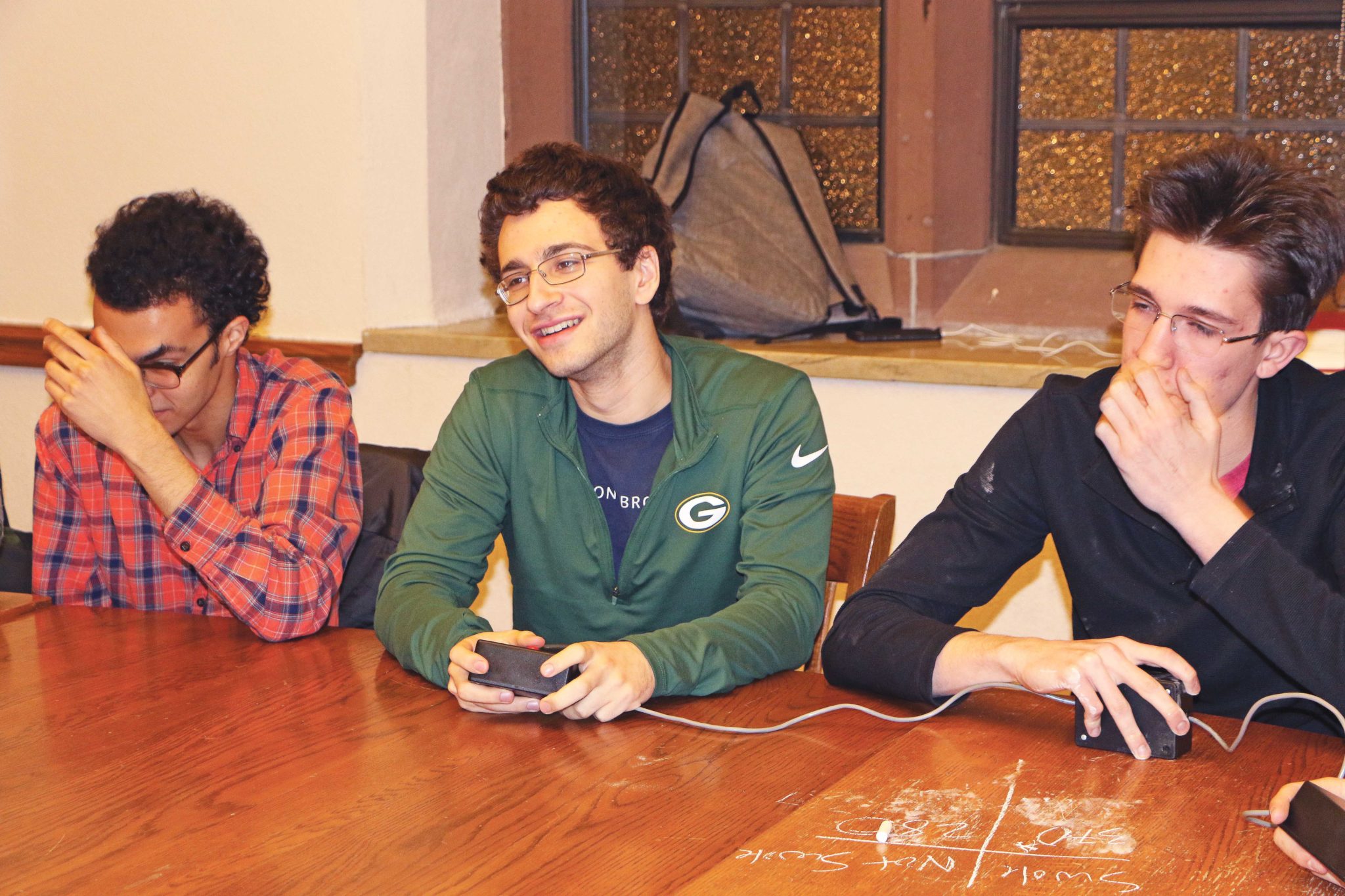
It’s 9:02 p.m. and eight students flow into LC 104. They split into two groups — a few on either side of a seminar table. Today is all business; two national championships loom. Competitors grab buzzers, and the moderator, Jacob Reed ’17 MUS ’19, begins reciting questions at breakneck speed.
“This ruler was the first to settle Germanic barbarians in the Roman Empire, and he auctioned off many palace valuables to pay for the empire’s wars. His reign saw a great plague and also saw Parthia invade Armenia, an action stopped by a man who would later declare himself emperor when this man was reported dead, Avidius Cassius — ”
Michael Kearney ’20 buzzes in before the question is finished: “Marcus Aurelius.”
“Good buzz,” Reed responds.
This is the Yale Quiz Bowl team, the top-ranked group in the country. Officially named, “Yale Student Academic Competitions,” the team meets every Monday and Wednesday from 9–11 p.m. Practices involve rapid-fire questions, brow-furrowing, face-contorting and both celebratory and uncelebratory outbursts.
The pop explanation of Quiz Bowl is “Jeopardy with teams.” Both involve academic questions and buzzers. Quiz Bowl clues, however, are denser and longer than Jeopardy ones, according to qbwiki.com, and players are allowed to buzz in before questions are complete. Quiz Bowl participants do not pick categories; different topics — literature, science, fine arts, history and more — can come at any time.
In Quiz Bowl, there are two national championships — the Intercollegiate Championship Tournament and Academic Competition Federation Nationals — both held in April. Last year, the team finished fifth and third, respectively. It hasn’t won either title since 2013, when it was led by Quiz Bowl legend and 14-time Jeopardy champion Matt Jackson ’14. But this could be the year for the Quiz Bowl A-team.
“We’re gunning for both,” said Reed, the former-captain and current A-team member.
In Quiz Bowl, teams are made up of four members. Each player is crucial. Yale was good last year, and this year the entire team is back. Some perennial contenders, including MIT, the University of Michigan, Northwestern University and Maryland, lost some of their key players to graduation.
“Essentially what happened is the perfect storm of Yale A being able to stay together for another year and most of the other top teams losing their best players,” said Moses Kitakule ’19, the organization’s president and B-team captain.
The A-team is made up of Reed, Stephen Eltinge GRD ’21, Isaac Kirk-Davidoff ’18 and Adam Fine ’19. According to active qbwiki user, “Periplus of the Erythraean Sea,” the team’s strengths include arts, sciences, philosophy and social sciences. Its weaknesses, Periplus states, are history and literature — but he clarifies, “they’re not bad at these categories by any means.”
While most members of the team would be considered generalists — players capable of answering questions from any category — each has his strengths. Reed is considered the best fine arts player in the country. Eltinge dominates the sciences, primarily physics. Kirk-Davidoff is a “renowned NAQT monster,” according to Peripius, which means he excels at current events, pop culture and geography questions. Fine is the team’s mythology player and excels at organic chemistry questions, even though he has never taken a Yale chemistry class.
Fine is what Reed would call a “flashcarder,” a word sometimes used pejoratively among Quiz Bowlers to describe someone who does not truly understand the concept, even if he can answer the question correctly. Fine does not mind the term.
“I do actually think that there’s no better method of keeping information in memory than flashcards, so anyone who isn’t flashcarding is at a competitive disadvantage,” he said.
There are other ways to prepare: writing Quiz Bowl–style questions, reviewing past questions and reading. Most skilled players employ multiple methods. If Eltinge comes across a “juicy clue” while reading or studying, he’ll store it on his hard drive. Kirk-Davidoff relies almost exclusively on reading. Reed is known for reading entire textbooks.
To be a good Quiz Bowl player, you have to be curious — Reed says, “obnoxiously curious” — and competitive about knowledge. Often, skilled Quiz Bowlers are irked even after they get a question right because they wish they had buzzed in sooner. That’s what makes them good.
“If you like learning things or want to show off your knowledge, this is your place to be,” Kitakule said. “It’s a very competitive game, make no mistake about that, but it’s a ton of fun and I’ve learned a lot in my time playing it.”
Quiz Bowl prominence is tenuous. Soon, Kirk-Davidoff will graduate. The following year, Fine and Reed will graduate, too. But the team is not worried about that now; they’re worried about national championships.
Jacob Sweet | jacob.sweet@yale.edu







